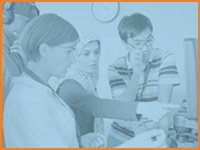2014 Summer Institute
Attendees participate in two weeks of lectures and hands-on training in engineering and physical science laboratory techniques by experts in the field. Topics include cancer nanotechnology, cell mechanics, molecular biology, micro fabrication, and NanoBio devices.
Featuring invited lecturers from:
- California Institute of Technology
- Georgia Institute of Technology
- Harvard University
- Massachusetts Institute of Technology
- Northwestern University
- Stanford University
- University of California, Berkeley
- University of California, Merced
- University of Illinois at Urbana-Champaign
- University of Kentucky
- Virginia Tech
- Industry
Summer Institute flyer
Download an 8.5 x 11-in. PDF of the flyer.
The Program also will be available as a PDF.
Sponsors
The Summer Institute is sponsored by NSF IGERT, NIH M-CNTC, NSF EBICS, NCI/NCI Alliance for Nanotechnology, CNST, and NSF nanoBIO node.










The Summer Institute is being held at the University of Illinois at Urbana-Champaign, Urbana, IL, USA

INSTITUTE FOCUS:
Cancer Nanotechnology and Cell Mechanics
OBJECTIVES
The overall objective is to enhance the ability to address challenges in Cancer Nanotechnology and Mechanobiology. The 2014 Summer Institute offers expertise from interdisciplinary faculty in biology, engineering, materials science, and nanotechnology through a combination of lectures and hands-on lab experiences.
Specific objectives include:
- Train next-generation researchers in nanotechnology, applied to both engineering and biology through lectures and hands-on experiences
- Foster multi-lateral and multi-disciplinary collaboration and interaction
